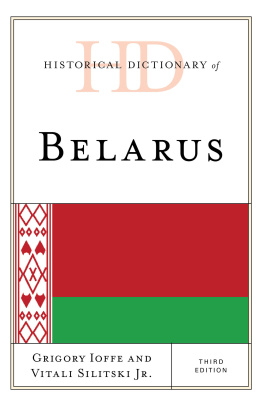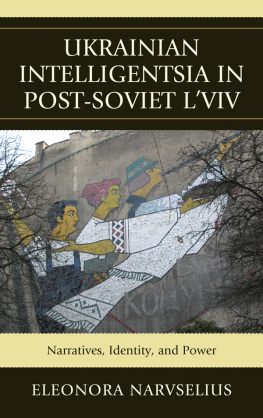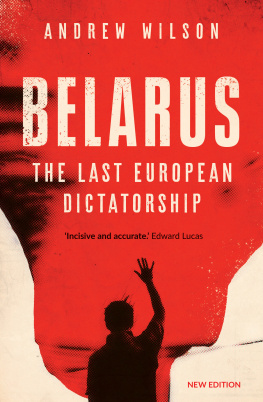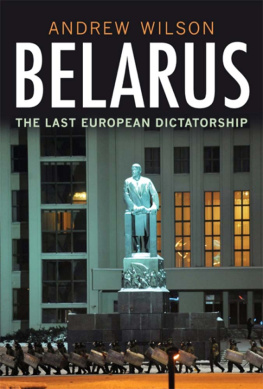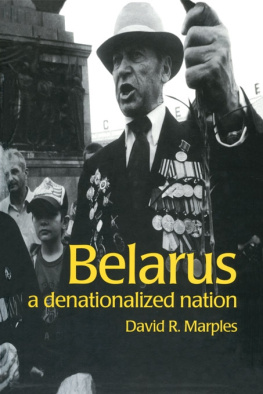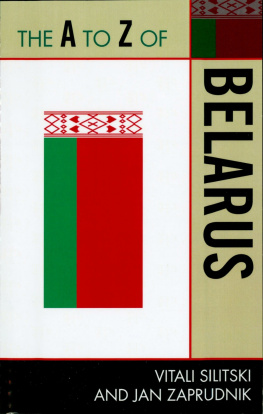
Belarus Alternative Visions
Belarus is often regarded as Europes last dictatorship, a fossilized leftover from the Soviet Union. However, a key factor in determining Belaruss development, including its likely future development, is its own sense of identity. This book explores the complex debates and competing narratives surrounding Belaruss identity, revealing a far more diverse picture than the widely accepted monolithic post-Soviet nation. It examines in a range of media including historiography, films and literature how visions of Belarus as a nation have been constructed from the nineteenth century to the present day. It outlines a complex picture of contested myths the peasant nation of the nineteenth century, the devoted Soviet republic of the late twentieth century and the revisionist Belarusian nationalism of the present. The author shows that Belarus is characterized by immense cultural, linguistic and ethnic polyphony, both in its lived history and in its cultural imaginary. The book analyses important examples of writing in and about Belarus, in Belarusian, Polish and Russian, revealing how different modes of rooted cosmopolitanism have been articulated.
Simon Lewis is a DFG (Deutsche Forschungsgemeinschaft) Research Fellow in the Institute for Slavonic Studies at the University of Potsdam.
For a full list of available titles please visit: www.routledge.com/BASEES-Routledge-Series-on-Russian-and-East-European-Studies/book-series/BASEES
Series editors:
Sociology and Anthropology: Judith Pallot (President of BASEES and Chair), University of Oxford
Economics and Business: Richard Connolly, University of Birmingham
Media and Cultural studies: Birgit Beumers, University of Aberystwyth
Politics and International Relations: Andrew Wilson, School of Slavonic and East European Studies, University College London
History: Matt Rendle, University of Exeter
This series is published on behalf of BASEES (the British Association for Slavonic and East European Studies). The series comprises original, high-quality, research-level work by both new and established scholars on all aspects of Russian, Soviet, post-Soviet and East European Studies in humanities and social science subjects.
125. Class Cultures in Post-Socialist Eastern Europe
Draen Cepi
126. Belarus Alternative Visions
Nation, Memory and Cosmopolitanism
Simon Lewis
127. Russian Culture in the Era of Globalisation
Edited by Vlad Strukov and Sarah Hudspith
128. Security, Society and the State in the Caucasus
Edited by Kevork Oskanian and Derek Averre
Belarus Alternative Visions
Nation, Memory and Cosmopolitanism
Simon Lewis
First published 2019
by Routledge
2 Park Square, Milton Park, Abingdon, Oxon OX14 4RN
and by Routledge
52 Vanderbilt Avenue, New York, NY 10017
Routledge is an imprint of the Taylor & Francis Group, an informa business
2019 Simon Lewis
The right of Simon Lewis to be identified as author of this work has been asserted by him in accordance with sections 77 and 78 of the Copyright, Designs and Patents Act 1988.
All rights reserved. No part of this book may be reprinted or reproduced or utilised in any form or by any electronic, mechanical, or other means, now known or hereafter invented, including photocopying and recording, or in any information storage or retrieval system, without permission in writing from the publishers.
Trademark notice : Product or corporate names may be trademarks or registered trademarks, and are used only for identification and explanation without intent to infringe.
British Library Cataloguing in Publication Data
A catalogue record for this book is available from the British Library
Library of Congress Cataloging in Publication Data
A catalog record has been requested for this book
ISBN: 978-1-138-31046-9 (hbk)
ISBN: 978-1-315-14374-3 (ebk)
Typeset in Times New Roman
by Swales & Willis Ltd, Exeter, Devon, UK
This book is based on a doctoral dissertation written at the University of Cambridge between 2010 and 2014. As such, it has been a long time in the making and has traversed many different places, from the conception of a doctoral project at the application stage, to the actual research and writing as a PhD student, to later revisions in order to turn a hastily submitted thesis into a viable monograph. To thank everyone who has benefitted the work during the course of these journeys would be an impossible task: I cannot begin to list the librarians and administrators who worked behind the scenes to keep me afloat in various institutions; the many people, some of whose names I never even learned, who fielded challenging and intriguing questions at conferences and talks; the editors and anonymous reviewers who gave insightful feedback to articles that I submitted to journals and edited volumes, which included earlier versions of some sections of this book (see below for details); and the students, friends and teachers who affected my thinking without me ever registering their influence. In the unlikely event that any of these people pick up this volume, I extend my gratitude, however impersonal.
My interest in Belarus first developed in around 2008 in Warsaw, Poland, where I first became aware of the countrys culture and politics. It was here, concurrently with studying for a Masters at the Institute of Philosophy and Sociology at the Polish Academy of Sciences, that I learned of contemporary Belarusian music, documentary film, literature and visual art. Without the friendship and advice of Mark Bence, Sasha Godina, Nelly Bekus, Helena-Alexandra Reut, Inna Reut, Andrzej Krzaku Strycharczuk, Vasil Lepesh, Alex Kirby, and others, the first (and therefore the most vital) steps towards this study would never have been made.
It was at Cambridge that the bulk of the work was completed. An enormous debt of gratitude is owed to my first supervisor, Alexander Etkind, for guiding me through the research process for the first three years. I am equally grateful to Susan Larsen, who so ably took over the supervision of the thesis for the final twelve months. Emma Widdis and Rory Finnin also provided indispensable advice at numerous junctures during my time as a student, and Julie Fedor was a tireless reader of many drafts as well as a kind neighbour and friend alongside Adam Fedor. The other members of the Cambridge team of the Memory At War project provided companionship and a fertile exchange of ideas: Uilleam Blacker, Judy Brown, Molly Flynn, Rolf Fredheim, Olesya Khromeychuk, Tom Rowley, Harald Wydra, and Tanya Zaharchenko. Jill Gather kept the project running with her permanent kindness and expert administration. Mel Bach, the Slavonic Specialist at Cambridge University Library, was always available to consult on resources and to help in obtaining books. Nelly Bekus remained, as ever, a vital source of knowledge about Belarus and a careful reader of several draft chapters. Arnold McMillin was always at hand to offer suggestions of primary sources that should be consulted, and generously accompanied me on my first visit to the Frantsysk Skaryna Belarusian Library in London. The late Fr Alexander Nadson was very helpful in locating and suggesting materials at the library itself, as well as being the spiritual leader of the Belarusian community in London; he is greatly missed. In Belarus and Poland, Zmitser Navitski, Aliaksei Bratachkin, Aleh Latyshonak, Jerzy Grzybowski, Anatol Mikhnavets, Tatsiana Astrouskaya and Jan Maksymiuk assisted at various junctures, by providing resources and crucial insights.


